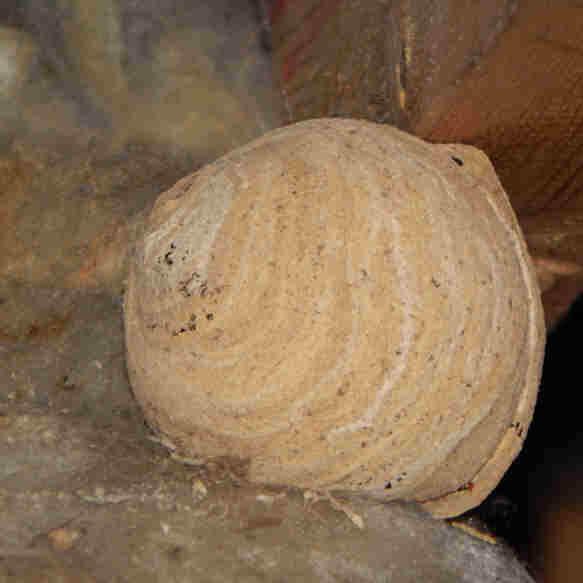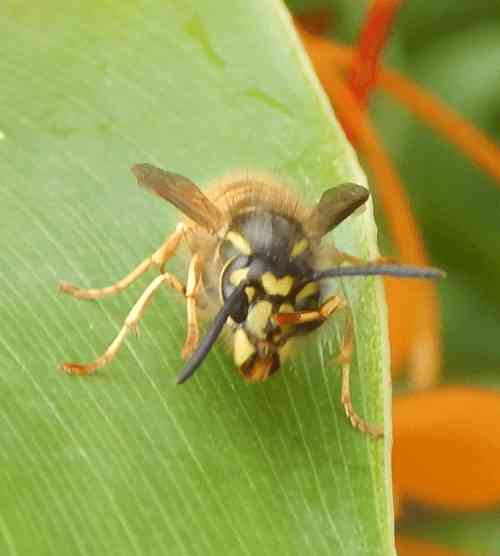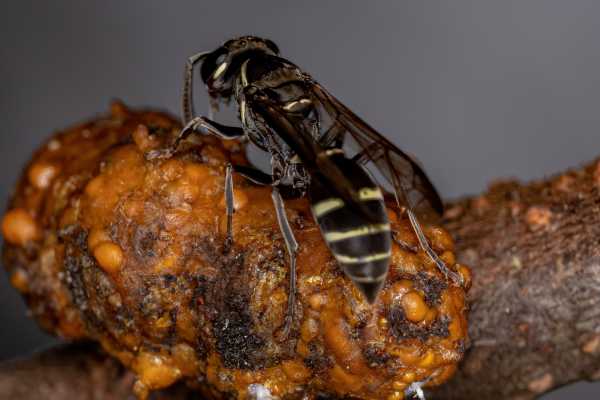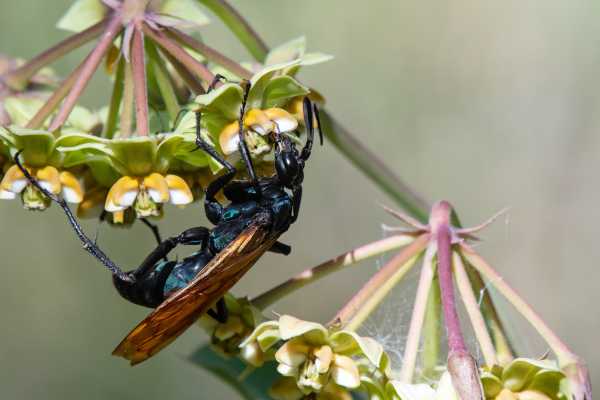How To Repel Or Remove Wasps Without Killing Them
Updated: November 2023
How can you repel or remove wasps without actually killing them?
Increasingly, people are understanding that wasps are beneficial to the environment: they are pollinators and helpful as a form of natural pest control in the garden, carrying off aphids to feed their young.
We are increasingly evolving beyond the 'kill anything we may think is a threat' position, to trying to find other methods of dealing with every day issues and concerns.
Removing wasp nests - 3 points to consider
 This wasp nest was in our attic. We had no idea it was there until we discovered it when we were retrieving a box of Christmas decorations. By then, the nest was long abandoned. The wasps had not bothered us at all.
This wasp nest was in our attic. We had no idea it was there until we discovered it when we were retrieving a box of Christmas decorations. By then, the nest was long abandoned. The wasps had not bothered us at all.- Aerial wasp nests only last a season.
- You are more likely to be bothered by an active wasp colony later in the season when the colony is well developed.
- Sometimes, it is possible to hang a net curtain or similar to serve as a barrier before the nest becomes very active (but ensure you wear protective clothing e.g. long sleeves). You can buy cheap net curtaining from thrift stores or charity shops. You'll need to avoid going close to the nest later in the season.
- Not all nests look like the one pictures above. If you have a sprawling nest in a cavity in your home, it may be a good idea to have it removed if it is causing a nuisance. In some regions of the world, such a nest can be perennial for certain species, but this is not the case in all regions.
If you really must remove an active wasp nest with many, many wasps, you will not be able to do this yourself. You will need to seek the assistance of a professional.
I am not aware of any pest controllers who remove active wasp nests without killing the wasps.
If we do not wish to harm or kill the wasps, what we need to do is dissuade them from bothering us for the period that they are around.
In this way, we can get rid of wasps without killing them, whilst allowing them to get along with their jobs in the eco-system.
Repelling wasps
1. Wasps around the BBQ or picnic table. Repelling wasps when eating or camping out doors
You are more likely to be bothered by wasps later in the season, when there are more workers, males and generally more mouths to feed. Please note, male wasps cannot sting.
You may find they are attracted to sweet drinks, jams and cakes.
Try the following tips:
- Hang a 'Waspinator' by your barbecue or eating area. They mimic wasp nests which, (because wasps are territorial) is said to help drive them away and deters wasps from building nests.
Another theory is that a bag of water with a shiny coin inside helps to deter wasps. Apparently, the sound of the coin causes a very high pitched vibration wave the wasps don't like.
Is this correct, and does it work? I have been told it does work, but have not tried it, and would be interested to hear of any success or otherwise with this method!
- Cover sweets drinks and foods.
- If you have a large garden, try distracting wasps to another location, by placing over ripe fruit, sugar water, banana
skins away from seating and eating areas.
- Keep bare feet covered - especially where children are concerned.
- Use a safe, deet-free insect repellent. Try a repellent containing Picaridin.
- Do not eat whilst standing or seated near to open trash bins, and generally ensure the lids of household refuse containers are kept firmly in place.
- Do not plan your eating areas or have your picnics in a location close to soft fruit trees - especially ripe plums or apricots, for example, because wasps are attracted to soft, ripe, fruits.
- There is a theory that wasps are attracted to perspiration, so wear an anti-perspirant! There are even versions available containing natural insect repellents.
- If you are camping, check whether some of your clothing and equipment (such as sleeping bag, rucksack) can safely be sprayed with a deet-free repellent.
2. Wasps around children, babies and their prams
- Try a wrist band insect repellent for children. Many are deet free.
- Check whether children's clothing / hats / pram covers can be sprayed with a suitable deet-free repellent. Ensure the repellent you use is safe
for this purpose, especially where babies are
concerned.
- Clean and dry children's hands and faces after and during eating, and change clothing that has had spillages - especially things like fruit juice and ice cream.
- Clean away food and liquid spillage around children.
- Ensure food is covered. For picnics, try to take yummy foods that can be popped into the mouth and kept in a sealed container. Ensure drinks are covered and your child uses a straw.
- Don't let your children run around in bare feet - including on lawns. Keep feet covered.
3. Wasps near the house, window, office, porch, front door, garden shed, or guttering
Firstly, try to keep wasps out of your house, office or building:
- Keep sweet drinks, cakes,
soft fruit away from windows!
- Tape net fabric securely to
the windows to prevent wasps entering. Net fabric can be purchased cheaply and be quite effective as a temporary solution.
- However tempted you are to
splat the wasps, don't - you'll only attract more of them!
- If you are especially
concerned, try a deet-free, non toxic insect repellent sprayed on the net fabric or around the windows and doors (check it won't
be flammable, even in direct sunlight, and you may have to spray the curtain
repeatedly). Check the repellent can be safely used in such a way first.
Finally........
Try the bag and coin trick described above, and hang a Waspinator to prevent wasp visitors next season!



